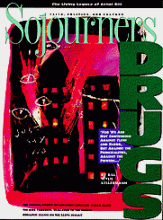Jamaican-Canadian Lillian Allen's dub poetry album Revolutionary Tea Party is dedicated to her daughter Anta and her "little friend"—"the future who stand up!" This album and her Conditions Critical are both about standing up to oppressive principalities and powers with laughter and dignity, with love and anger. Together they are a double whammy of resistance and affirmation. Both recordings won Canadian Juno Awards for best reggae/calypso albums of their respective years.
While they are not hot off the press, they continue to fire up new possibilities for cultural resistance through the innovative collaboration of voice, music, and technology. Those who draw strength and hope from popular culture with a justice vision will find much to celebrate here.
Lillian Allen said in an interview, "Anything that victimizes humanity would be fair game for my poetry." Inviting others to join in struggle, her poems and music confront an array of intersecting justice issues. "Dis Ya Mumma Earth" follows in the black church tradition of preaching oratory. Allen calls her congregation to "Get up! Stand up!/Shout en masse/Wail in the wilderness/Our will...will be/Peace, justice, equality/Join hands in liberation dance/Freedom chants/We are our only weapon for peace."
Dub poetry is kin to a variety of African and Caribbean-influenced oral and musical forms including spirituals, gospel hymns, slave work songs, call and response preacher-congregation exchanges, freedom speeches, dialect poetry, story-telling, reggae, and rap, to name a few. It derives specifically from the Jamaican DJ practice of dubbing improvised lyrics over a prerecorded reggae track on which the vocals have been dubbed out and the instrumental tracks altered for emphasis.
Read the Full Article
